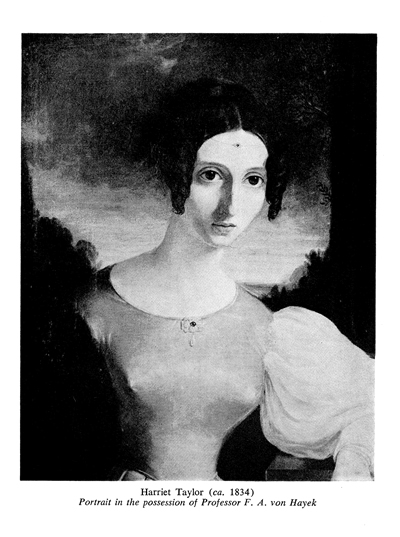Liberty Matters
Against Paternalism..

This discussion has helped me focus on two questions. First, why has Harriet Taylor Mill’s contribution to John Stuart Mill’s economics been disparaged for so long? Second, why has Mill’s contribution to economics been so disparaged? It might be helpful to consider them together. As Sandra Peart pointed out in her initial contribution, Lionel Robbins acknowledged that the economists at his London School of Economics were bad actors in the myth of Mill’s unoriginality. George Stigler, who shattered this myth in a 1955 article published in the London School of Economics journal, Economica, attributed the problem to Mill’s modesty. (Levy and Peart 2022) Stigler “joked” that in a world of self-promoters, Mill’s contributions would pass unnoticed because had he behaved like everyone else, he would have hawked his important contributions on street corners. This error cascades: if there were nothing original in Principles of Political Economy, then Harriet Taylor Mill could not have made an original contribution to economics.
I found Jo Ellen Jacob’s edition of Harriet Taylor Mill’s works very useful because I was able to focus on the chapter which J. S. Mill attests was “entirely due to her” (in Jacobs, 1998, p. 291). And now, as Helen McCabe points in her helpful contribution, there is replicable statistical evidence for skeptics to check J. S. Mill’s testimony. All this being said, I think Harriet Taylor Mill even today is not truly appreciated, at least by non-specialists. Helena Rosenblatt in her Lost History of Liberalism points to Harriet Taylor Mill’s importance by summarizing her teaching:
No individual should be allowed to decide for another what was in his or her proper sphere. Every occupation should be open to all, with complete liberty of choice for everyone (2018, pp. 150-151).
This is, of course, correct but I think there is much more that might be said since one can find the same point of view in Adam Smith’s An Inquiry into the Nature and Causes of the Wealth of Nations.
The problem is, perhaps, that the long contribution of liberalism to economics has been of late reduced to the issue of “markets” vs. “the state.” Reading Harriet Taylor Mill’s contribution in isolation, it is now obvious that she articulates an anti-state paternalistic strain of classical liberalism. In her time a paternalist opposition to liberalism could be found in pure form in Fraser’s (Thrall 1934, Weston 2001). It seems clear that the strain of liberalism that Harriet Taylor Mill articulated is found in the work of Abram Harris and Frank Knight (Levy and Peart 2023). Harris, whose involvement in the early days of the American Civil Rights movement is well-known (Miller 2012), tells us why he abandoned Karl Marx, Thorstein Veblen, et al. in favor of Mill:
I came to regard Marx, Veblen, Sombart, Commons, and Pesch as representatives of patterns of thought which depart not only from the analytical methods of traditional economic theory but also from the principles of classical liberalism concerning the meaning of freedom and the political conditions under which it can best be realized. … In making this examination, my guiding spirit became John Stuart Mill, for whom my admiration has increased over the years … his social philosophy which embraces most that is good in our nineteenth century libertarian inheritance. (1958, xiv-xv)
Knight, to whom Harris acknowledges a great debt (Harris 1958, v) alone, of all his contemporaries, took the family as the unit of analysis for economics. If the family is the unit of analysis, then there is a context to explain how people move from being dependent children to being independent adults. We can observe Milton Friedman’s drift from Knight’s teaching by the change in his attitude toward state paternalism (Levy and Peart 2023)
It is appropriate to end by noting that Sandra Peart’s edition of Hayek on Mill is now in paperback via Liberty Fund. To vary Deirdre McCloskey’s joke, at the Liberty Fund price this is surely a suitable holiday gift for young and old!
References
Harris, Abram L. 1958. Economics and Social Reform. New York: Harper & Brothers.
Hayek, F. A. 2024. Hayek on Mill: The Mill-Taylor Friendship and Related Writings. Edited by Sandra J. Peart. Indianapolis: Liberty Fund.
Levy, David M. and Sandra J. Peart. 2022. “George J. Stigler (1911-1991)” In The Palgrave Companion to Chicago Economics. Edited by Robert A Cord. Cham, Switzerland: Palgrave.
Levy, David M. and Sandra J. Peart. 2023. “The Hidden Hand of W. E. B. Du Bois: Frank H. Knight’s Eulogy of Abram L. Harris.” Presented at the History of Economics Conference. Vancouver.
Miller, Eben. 2012. Born Along the Color Line: The 1933 Amenia Conference and the Rise of the National Civil Rights Movement. New York: Oxford University Press.
Rosenblatt, Helena. 2018. The Lost History of Liberalism: From Ancient Rome to the Twenty-First Century. Princeton: Princeton University Press.
Taylor Mill, Harriet. 1998. The Complete Works of Harriet Taylor Mill. Edited by Jo Ellen Jacobs and Paula Harms Payne. Bloomington and Indianapolis. Indiana University Press.
Thrall, Miriam M. H. 1934. Rebellious Fraser’s: Nol Yorke’s Magazine in the Days of Maginn, Thackeray, and Carlyle. New York: Columbia University Press.
Weston, Nancy. 2001. Daniel Maclise: Irish Artist in Victorian London. Dublin: Four Courts Press.
Copyright and Fair Use Statement
“Liberty Matters” is the copyright of Liberty Fund, Inc. This material is put on line to further the educational goals of Liberty Fund, Inc. These essays and responses may be quoted and otherwise used under “fair use” provisions for educational and academic purposes. To reprint these essays in course booklets requires the prior permission of Liberty Fund, Inc. Please contact oll@libertyfund.org if you have any questions.